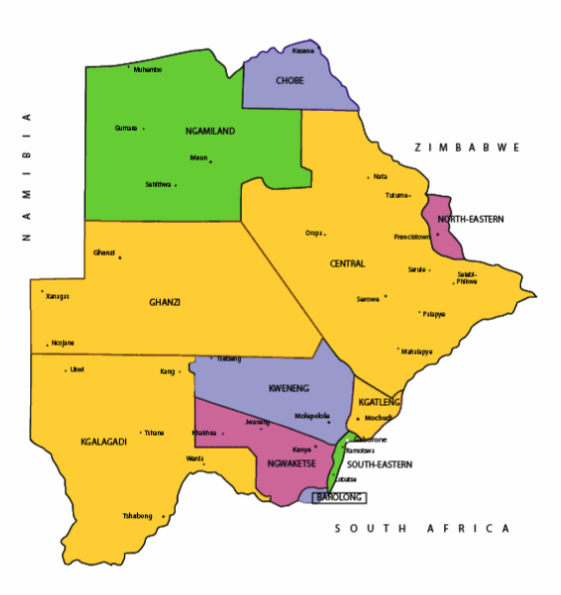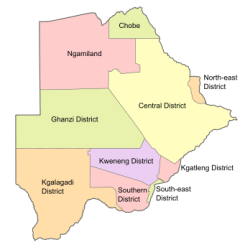
Independent Electoral Commission of Botswana, 2019
The places for voting, during elections, located abroad for Botswana people in diaspora are:
491 Australia
2259 Canberra – Botswana High Commission
2260 Sydney
2261 Melbourne
2262 Perth
2263 Brisbane
2264 Adelaide
492 Belgium
2265 Brussels – Botswana Embassy
493 Brazil
2266 Brasilia – Botswana Embassy
494 China
2267 Beijing – Botswana Embassy
2268 Kuala Lumpur (Malaysia)
495 Ethiopia
2269 Addis Ababa – Botswana Embassy
496 India
2270 New Delhi – Botswana High Commission
2271 Mumbai – Botswana Trade And Investment Centre (BITC)
497 Japan
2272 Tokyo – Botswana Embassy
498 Kenya
2273 Nairobi – Botswana High Commission
499 Kuwait
2274 Kuwait City – Botswana Embassy
500 Mozambique
2275 Maputo – Botswana High Commission
501 Namibia
2276 Windhoek – Botswana High Commission
502 Nigeria
2277 Abuja – Botswana High Commission
503 South Africa
2278 Pretoria – Botswana High Commission
2279 Bloemfontein – Central University of Technology
2280 Durban – Durban University of Technology
2281 Johannesburg – Botswana Consulate General
2282 Port Elizabeth – Nelson Mandela Metropolitan University
2283 Cape Town – University of Cape Town
504 Sweden
2284 Stockholm – Botswana Embassy
2285 Moscow (Russia)
505 Switzerland
2286 Geneva – Botswana Embassy
506 United Kingdom
2287 London – Botswana High Commission
2288 Dublin (Republic of Ireland)
507 United States of America
2289 New York – Permanent Mission of The Republic of Botswana To
2290 Washington Dc – Botswana Embassy
508 Zambia
2291 Lusaka – Botswana High Commission
509 Zimbabwe
2292 Harare – Botswana High Commission
2293 Bulawayo
510 Germany
2294 Berlin – Botswana Embassy
Reference: iec.gov.bw/index.php/electoral-districts/polling-stations.html
Botswana
Botswana is a country in Africa. It is topographically flat, with approximately 70 percent of its territory being the Kalahari Desert.
It is bordered by South Africa to the south and southeast, Namibia to the west and north, and Zimbabwe to the northeast.
Capital: Gaborone
Currency: Botswanan Pula
Official language: English
Population: 2.588 million (2021) World Bank
Dialing code: +267
Gross Domestic Product: 17.61 billion USD (2021) World Bank
Botswana’s ten districts are:
- Southern District
- South-East District
- Kweneng District
- Kgatleng District
- Central District
- North-East District
- Ngamiland District
- Kgalagadi District
- Chobe District
- Ghanzi District
Botswana’s councils created from urban or town councils are: Gaborone City, Francistown, Lobatse Town, Selebi-Phikwe Town, Jwaneng Town, Orapa Town and Sowa Township.






The name Botswana refers to ‘Land of the Tswana’. The landlocked, Southern Africa country is officially known as the Republic of Botswana.
















Botswana is connected to Zambia through the Kazungula Bridge making it the world’s shortest border between two countries.
A country of slightly over 2 million people (2021), Botswana is one of the most sparsely populated countries in the world. It is essentially the nation state of the Tswana ethnic group, who make up 79% of the population.

About 11.6 per cent of the population lives in the capital and largest city, Gaborone.
Formerly one of the world’s poorest countries—with a GDP per capita of about US$70 per year in the late 1960s—it has since transformed itself into an upper-middle-income country, with one of the world’s fastest-growing economies.


The Tswana ethnic group were descended mainly from Bantu-speaking tribes who migrated southward of Africa to modern Botswana, living in tribal enclaves as farmers and herders.




In 1885, the British colonised the area and declared a protectorate under the name of Bechuanaland.
As colonisation stopped, Bechuanaland became an independent republic under its current name on 30 September 1966.


Since then, it has been a representative republic, with a consistent record of uninterrupted democratic elections and the lowest perceived corruption ranking in Africa since at least 1998.

The economy is dominated by mining and tourism. Botswana has a GDP (purchasing power parity) per capita of about $18,113 as of 2021, one of the highest in subsaharan Africa.


Botswana is the world’s biggest diamond producing country.
Its relatively high gross national income per capita gives the country a high standard of living and the third-highest Human Development Index of continental Sub-Saharan Africa (after Gabon and South Africa).
The country has been adversely affected by the HIV/AIDS epidemic. In 2002, Botswana began offering anti-retroviral drugs (ARVs) to help combat the epidemic.
Botswana is a member of the Southern African Customs Union, the Southern African Development Community, the Commonwealth of Nations, and the United Nations.
